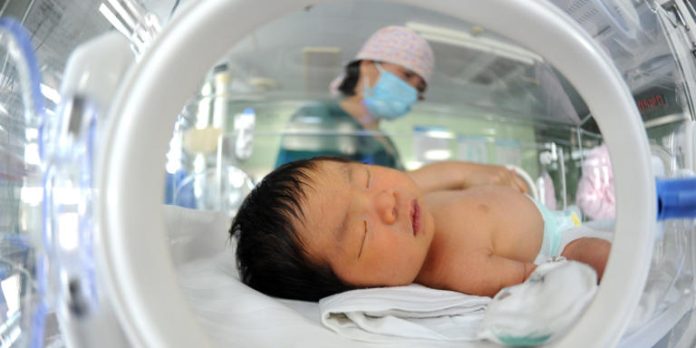For the second year in a row, China’s population fell.
Data from the country’s National Bureau of Statistics showed that China’s population declined by two million in 2023 while the birth rate fell from 6.77 births to 6.39 births per 1,000 people — a record low.
China has been scrambling to address the issue. The government reversed the country’s one-child policy in 2015. It has also offered financial incentives to parents, all the while extolling the virtues of marriage and childbearing.
But what if the problem lies with China’s government itself?
Wang Feng, a sociology professor at the University of California, Irvine, whose research areas include modern Chinese society, says that officials have known for a long time that the demographic crisis would come — albeit not as quickly as it has — and that the regime has been slow to act toward a solution.
“I think to the outsider, we tend to think that these regimes are able to gather national resources and devote them to major projects and can delivery quickly,” Wang told Business Insider, adding that that can be true with infrastructure projects such as China’s high-speed rail. “But when it comes to policymaking, it’s very easy to see these kind of regimes making laws that are disastrous and are very slow to end these policies because they don’t really want to take on the political baggage.”
China pivots
In recent years, the Chinese Community Party and local governments have shifted toward laws or programs that are meant to encourage young women to bear children and enter into a marriage.
Hangzhou, a populous city in East China, began offering new parents 20,000 Chinese yuan, or about $2,800, for having a third child. In Wenzhou, in southeast China, the government offered up to 3,000 yuan per child.
China’s ruling party introduced a “three-child policy” in 2021, welcoming families to have more than two children. But still, the Chinese population — young people, in particular — did not bite.
“Young people are laughing at the government for believing that it actually can ask people what to do and what not to do,” Wang said, pointing to the failure of the country’s one-child policy.
A solution for China’s demographic crisis likely won’t come through a few policy initiatives, Wang argued. The country is dealing with a deep-rooted and highly complex problem that reflects a broad despair and pessimism young people have about their future as the country has gone through rapid economic growth and changes, he said.
This is an issue China will be dealing with for the “long haul,” Wang said.
The government also enacted laws that some citizens argue are a step backward from its efforts to get more people to start a family.
In 2021, the government implemented a 30-day “cooling-off period” for married couples to curb impulsive divorces. The law was introduced, in part, as an effort to boost the country’s birth rate.
But online, some Chinese citizens argue that it discourages marriages, while experts say that it could make it harder for women to get out of abusive relationships.
Ethan Michelson, Indiana University Bloomington’s department chair in East Asian Languages and Cultures and author of “Decoupling,” which examines divorce cases in China, told Business Insider that the law likely isn’t a huge driver in the country’s declining birth or marriage rates — but it probably won’t help.
“When I present my research findings, I hear this all the time from Chinese women. They say, ‘Why on earth would anybody get married? Why would they take the risk?'” he said.
There’s no magic policy wand
Democratic societies have also experimented with financial incentives and pro-family policies yet still struggle with birth rate declines, Wang and Michelson told BI.
Seoul, South Korea, offered parents $1,650 in cash vouchers for every baby born in 2022. In Italy, giving birth is free, and the country offers a so-called “baby bonus” that acts as an allowance for families with newborns. Taiwan has so far invested $3 billion in implementing programs to get more citizens to have children, The Los Angeles Times reported.
Each country experienced record-low birth rates within the past few years.
This is a “global shift,” Wang told BI. “There’s a global shift in what it means to have a family and the meaning of marriage and having children in people’s lives.”









































